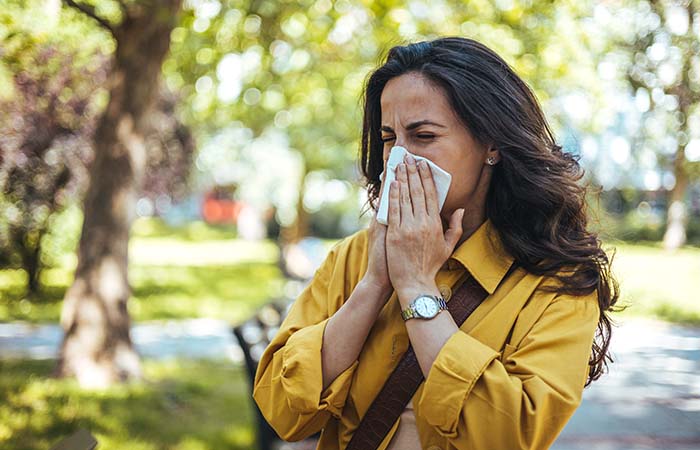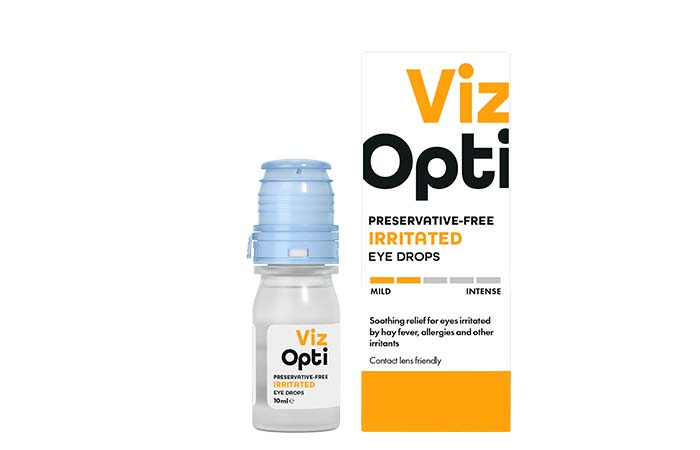An allergy survival guide for pharmacy patients
In OTC
Follow this topic
Bookmark
Record learning outcomes
Customers struggling with sneezes, itchy eyes, and congestion? Seasonal allergies can make life miserable, but some allergies are all year round and life-long. Victoria Goldman discovers the latest medications and treatments, to help them all breathe easier
According to Allergy UK, it’s estimated that one in two people in Europe will be living with an allergy by 2026. Despite the continuing rise in cases, important information about allergies is often overlooked or ignored, and many people still don’t realise that allergies are potentially life-threatening chronic health conditions and not simply a minor inconvenience.
The hay fever season is expected to be particularly severe this year too, and people with hay fever are four times more likely to suffer from other conditions caused or worsened by allergies, such as asthma, eczema and food allergy.
Some allergy symptoms are mild enough to be treated in primary care. Others, including severe hay fever, need specialist treatment if they don’t respond to conventional allergy medicines.
Yet specialist allergy care isn’t always available on the NHS or in some parts of the UK, and many people’s allergies remain undiagnosed or undertreated.
In August 2024, researchers from Imperial College London estimated that the number of people with a food allergy in the UK has more than doubled since 2008, with the largest increase seen in young children.
The analysis, published in the journal Lancet Public Health, found that up to four per cent of pre-school-aged children have a food allergy, while rates in adults were around one per cent.
Most patients with a food allergy, including those with previous anaphylaxis, are only seen in GP surgeries rather than in a hospital setting.
According to the researchers, prescriptions for adrenaline autoinjectors in those with previous anaphylaxis were estimated to be at 64 per cent for children and young people and just 55 per cent for adults.
The authors say there’s an urgent need to ensure GPs and other primary care staff are adequately trained and supported to care for people at risk of a severe food allergy.
An allergy is more than just a physical issue – it can have a significant impact on people’s mental health and affect the whole family. In turn, stress, anxiety and depression can make allergy symptoms worse.
Results from a new survey commissioned by Dymista Control found that 55 per cent of moderate to severe hay fever sufferers say that their symptoms have caused them to miss personal celebrations, professional commitments or watching and playing sport.
In addition, 88 per cent avoid attending outdoor activities at the time of year that they suffer with symptoms, and over a third said they cancel plans due to their hay fever symptoms during peak pollen season on a weekly or monthly basis.
Product focus: VizOpti Irritated Eye Drops
For patients experiencing irritated, itchy, or allergy-prone eyes, the new VizOpti Irritated Eye Drops from EM Pharma enables pharmacies to offer a highly effective, preservative-free solution. Formulated with natural plant extracts, the drops are especially suitable for patients requiring frequent application, those with sensitive eyes and contact lens wearers. They provide immediate relief by soothing and cooling the eyes while alleviating symptoms such as itching, burning, grittiness, and discomfort.
EM Pharma: 01664 820347
Early diagnosis
Allergy UK’s new ‘I Wish I Knew…’ campaign is emphasising the importance of early interventions – when the symptoms of an allergy first appear. The charity has highlighted three key facts that everyone needs to know about allergies.
The aim is to encourage more people with allergy symptoms to take action early to get the help and support they need. These three facts are:
Allergies can appear at any age or stage of life – 50 per cent of food allergies develop in adults over 35.
Being diagnosed matters – it is key to managing symptoms, preventing complications and improving quality of life.
Could it be allergies? Other health conditions such as eczema and asthma are often triggered by allergies, and allergies can contribute to or worsen digestive conditions, sinusitis and even mental health problems.
“Our healthcare system isn’t optimised to provide adequate care for allergic conditions, so it’s important anyone who is newly experiencing allergy symptoms is able to recognise the red flags to seek support,” says Simone Miles, chief executive of Allergy UK.
“Early intervention can even change the course of an allergy, and people need to be empowered with the right information to enable them to take advantage of this. An allergy diagnosis isn’t just a label, it’s the key to managing symptoms, preventing severe reactions and complications and improving quality of life.”
Allergy UK has been campaigning for more community-based allergy specialists in primary care, including specialist allergy nurses and allergy dietitians.
This would help to improve access to care, reduce waiting times and help patients stick to allergy management plans more easily. In addition, Allergy UK would like to see the removal of prescription costs for those living with allergies.
There’s also a potential increased role for community pharmacists in day-to-day allergy management.
According to Miles in July 2024, reforming the GP system to ensure face-to-face appointments and continuity of care, along with creating a Community Pharmacist Prescribing Service, could make allergy management more accessible and efficient.
Increasing demand and reduced GP numbers means that getting a GP appointment has become a major barrier to diagnosis.
According to Healthwatch, in the last five years the number of fully qualified GPs has fallen by 3.45 per cent, but the number of appointments in general practice has increased by 16 per cent. Increasingly, people are going to a community pharmacist as a first-line option for allergy advice.
“While we have always provided a lot of advice for allergies, we are seeing more patients come to us before trying to get an appointment with the GP,” says Amanda Smith, community pharmacist in Halifax.
“This is possibly partly to do with the advertising campaigns advising people to go to Pharmacy First. There are several medicines we can supply over the counter to help people manage their allergy symptoms, and we can discuss those with the patient to determine if an allergy is the most likely cause.”
In Healthwatch’s ‘Pharmacy: What people want’ report in April 2024, 72 per cent of people had used a pharmacy in the previous three months.
Many people surveyed said that they value pharmacy accessibility, both in terms of getting to one and also in terms of the speed of being seen, and they were open to the idea of seeing a pharmacist rather than a GP more generally.
However, a small percentage still didn’t know what a pharmacy can offer them.
In addition, pharmacies are under increasing pressure, with shortages of both staff and medicines, and the number of pharmacies is shrinking.
Adam Saffa, independent prescribing pharmacist at Wigmore Medical in London, says that a future NHS-funded Community Pharmacist Prescribing Service could significantly enhance allergy management by enabling pharmacists to initiate and adjust treatments such as antihistamines, corticosteroid nasal sprays, or adrenaline autoinjectors for patients at risk of anaphylaxis.
“This expanded prescribing role would allow pharmacists to manage mild to moderate allergy symptoms directly within the pharmacy setting,” he says. “It would also enable faster intervention during flare-ups or seasonal allergy peaks, reducing reliance on GP appointments for routine adjustments.
“By improving timely access to appropriate medication, this service could result in better symptom control, improved quality of life, and increased patient confidence in managing their condition.”
Some pharmacies already offer private allergy testing services, using trained members of the pharmacy team to take blood samples and send these to a laboratory for testing.
GP surgeries may arrange specific IgE blood testing, but skin prick allergy tests are only available as part of a specialist allergy service at a hospital or clinic.
Any NHS-funded allergy testing through pharmacies would need to be offered under a structured protocol. “Pharmacists would be well-positioned to interpret results, provide tailored advice, and refer more complex cases to specialist services when necessary,” adds Saffa. “Integration within NHS frameworks would be essential to ensure clinical safety, robust governance and continuity of care across the healthcare system.
“Moreover, pharmacists could support ongoing education and monitoring, helping patients better understand and manage their allergies over time.”
The National Allergy Strategy Group (NASG) is currently focusing on the UK National Allergy Strategy 2025-2035, which was launched in late 2024.
This project is bringing together hundreds of experts, patients and their families to challenge the unmet needs of the UK allergic community with the aim of improving health outcomes and quality of life.
Current areas of focus include improving GP education and training and increasing the number of specialists within the NHS, but the NASG also has an interest in expanding pharmacy’s role.
“Pharmacists are key members of the primary care team who are valued for their knowledge and flexibility,” says Dr Elizabeth Angier, portfolio GP, National Allergy Strategy Group & Integrated Care Primary Care Lead at HIOW Integrated Care system, and PhD student at Southampton University. “They are now embedded in GP practices as part of the drive to bring more additional roles into the primary care workforce.
“Links with community pharmacists have also been strengthened by the Pharmacy First service for seven common conditions. We would be interested to hear from community pharmacists about their thoughts on how we can all work together to support allergy care and which aspects of care they would consider alongside what they are already doing.”
Medicines advice
The pharmacy portfolio of allergy medicines continues to expand. Some new allergy treatments, such as sublingual immunotherapy, must be begun in specialist hospital allergy clinics, but may then be continued at home on prescription, increasing the need for day-to-day pharmacy advice.
In January 2025, for example, NICE approved the launch of prescribed Acarizax tablets for people aged 12 to 65 who have moderate to severe and persistent allergic rhinitis.
“Although initial access to a specialist allergy service will mainly be required to commence treatment, importantly it can be continued as a home treatment, without the need for frequent hospital visits which incur travel and time costs,” says Amena Warner, head of clinical services at Allergy UK.
Research shows that patients may use certain allergy medicines, such as nasal sprays, inhalers and adrenaline autoinjectors, incorrectly.
In July 2024, the updated NICE Quality Standard on anaphylaxis stressed that people experiencing (or at risk of) anaphylaxis must be retrained on how to use their adrenaline autoinjector safely and effectively each time these medicines
are prescribed.
Community pharmacists play an important role in this, as most adrenaline autoinjectors are obtained through repeat prescriptions. The updated NICE Quality Standard also stressed that that patients should be reminded to check the expiry dates on their adrenaline autoinjectors.
“Community pharmacists can advise on the correct use of medicines, give advice on timing of medicines and how to get the most out of them,” says Smith. “We can demonstrate how to use adrenaline auto-injectors and give people the chance to ask us any questions.
“People who have been prescribed an adrenaline auto-injector for the first time can be quite worried about it, as they have usually just been through a frightening anaphylaxis experience, so it’s good that we can provide some reassurance.”
Pharmacists can also help to support people with allergies by providing tailored advice on reducing everyday risks at home, school or when eating out. Saffa says that pharmacies can stock a range of non-medicinal products that help to manage allergy symptoms and reduce allergen exposure.
“These include hypoallergenic skin care and personal care items such as fragrance-free moisturisers, soaps and shampoos suitable for sensitive or reactive skin,” he says. “Saline nasal sprays and nasal filters can assist with allergen clearance from nasal passages, especially during pollen season. Stocking these products not only supports patients’ physical wellbeing but also empowers them to take control of their allergy management.”


